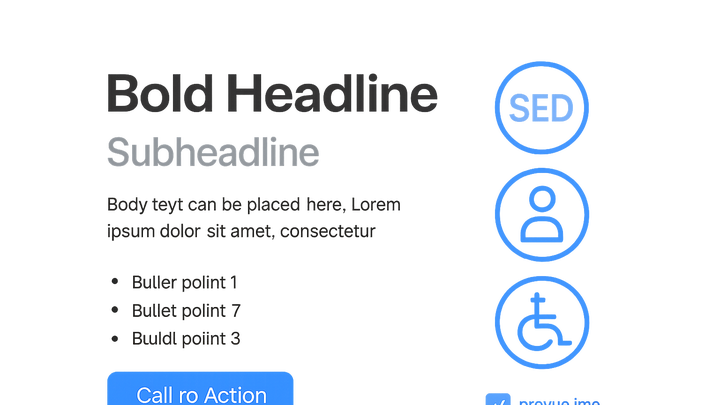Published on 2025-06-29T22:16:41Z
What is Landing Page Copy? Best Practices and Examples
Landing page copy is the crafted set of words—headlines, subheadlines, body text, and calls-to-action—used on a landing page with the primary goal of converting visitors into leads or customers. It should immediately engage your target audience, clearly convey your unique value proposition, and guide users toward a desired action. For CRO (Conversion Rate Optimization), persuasive copy can dramatically improve click-through and sign-up rates by focusing on benefits and reducing friction. From a UX perspective, well-structured, scannable text enhances readability and accessibility, ensuring all users can interact with your page seamlessly. In SEO, strategic keyword placement within the copy improves search rankings and organic traffic without sacrificing readability or authenticity. Tools like Prevue.me offer in-depth critiques of your landing page copy, providing actionable feedback on CRO, lead generation, UX, accessibility, and SEO to help you optimize performance.
Landing page copy
The written text on a landing page designed to convert visitors, focusing on headlines, body content, and CTAs for CRO, UX, & SEO.
Why Landing Page Copy Matters
Landing page copy is essential because it directly influences user perception, SEO, and conversion rates. It serves as both your first impression and persuasive pitch. High-quality copy reduces bounce rates, builds credibility, and aligns with user intent. It must balance persuasive messaging with SEO and accessibility requirements.
-
First impressions and engagement
The headline and subheadline form the first touchpoints for visitors, determining whether they stay or leave within seconds.
- Clarity:
Clear, concise headlines help users immediately understand the offer.
- Value proposition:
Highlighting unique benefits persuades visitors to stay and learn more.
- Clarity:
-
Conversion rate optimization
Effective copy guides users toward a specific action, improving key conversion metrics.
- Persuasive ctas:
Strong calls-to-action use action verbs and create a sense of urgency.
- Benefit-focused language:
Emphasizing benefits over features increases perceived value and drives conversions.
- Persuasive ctas:
-
Seo and discoverability
Strategic keyword inclusion in landing page copy can improve search rankings and organic traffic.
- Keyword placement:
Incorporate target keywords naturally in headlines and body text.
- Meta descriptions:
Optimized meta tags and descriptions boost click-through rates from search engines.
- Keyword placement:
Key Elements of Effective Landing Page Copy
Crafting high-performing landing page copy requires a structured approach. Each element—from headline to CTA—plays a unique role in guiding the user journey. Consistency in tone and messaging builds trust and drives action.
-
Headline
Your headline should immediately capture attention and summarize the core benefit.
- Brevity:
Keep headlines short (6–12 words) to ensure readability.
- Clarity:
Avoid jargon; use simple language to convey value quickly.
- Brevity:
-
Subheadline
A supporting line that expands on the headline, providing more context and enticing the reader to continue.
- Detail:
Use this space to clarify what you offer.
- Transition:
Guide visitors naturally into the body copy.
- Detail:
-
Body copy
The main text should explain features, benefits, and how your offer solves user problems.
- Bulleted lists:
Break down key points for easy scanning.
- Social proof:
Include testimonials or case study snippets to build credibility.
- Bulleted lists:
-
Call-to-action (cta)
Your CTA is the culmination of your copy; it should be clear, compelling, and action-oriented.
- Actionable text:
Use strong verbs like ‘Download,’ ‘Start,’ or ‘Get.’
- Visual contrast:
Ensure CTA buttons stand out visually on the page.
- Actionable text:
Best Practices and Optimization Strategies
To continuously improve landing page copy, implement ongoing testing and optimization. A/B testing, user feedback, and analytics data drive iterative enhancements. Prioritize readability and accessibility to cater to all users and support SEO goals.
-
A/b testing variations
Experiment with different headlines, CTAs, and body copy to see what resonates.
- Hypothesis-driven tests:
Define clear hypotheses (e.g., ‘Shorter headline increases form submissions’).
- Statistical significance:
Run tests long enough to reach reliable results.
- Hypothesis-driven tests:
-
Readability and scannability
Structure text with short paragraphs, bullet points, and subheadings to improve user experience.
- F-pattern layout:
Place most important content along the top and left side of the page.
- Readable typography:
Use legible fonts and adequate line spacing for comfortable reading.
- F-pattern layout:
-
Accessibility considerations
Ensure copy is accessible to all, including users with disabilities.
- Aria labels:
Add proper labels to interactive elements for screen reader compatibility.
- Color contrast:
Maintain high contrast between text and background for readability.
- Aria labels:
-
Seo fine-tuning
Optimize for search engines without compromising user experience.
- Lsi keywords:
Include related terms to improve semantic relevance.
- Meta tag optimization:
Write compelling meta titles and descriptions within character limits.
- Lsi keywords:
Leveraging Prevue.me for Actionable Critiques
prevue.me is a SaaS tool that provides automated critiques on landing page copy, UX, CRO, SEO, and accessibility. By integrating prevue.me into your optimization workflow, you can identify weak spots and receive targeted recommendations to improve performance and lead generation.
-
Cro and lead generation feedback
prevue.me evaluates your copy for persuasion, clarity, and conversion triggers.
- Headline effectiveness:
Analyzes clarity, uniqueness, and value proposition strength.
- Cta optimization:
Scores call-to-action copy for immediacy and relevance.
- Headline effectiveness:
-
Ux and accessibility analysis
The tool checks readability, layout flow, and accessibility compliance.
- Readability scores:
Measures text complexity and suggests adjustments for target audience.
- Accessibility checks:
Flags contrast issues and missing ARIA labels in content.
- Readability scores:
-
Seo insights
prevue.me highlights keyword usage, meta tags, and content structure for SEO.
- Keyword density:
Ensures optimal keyword frequency in copy without keyword stuffing.
- Semantic structure:
Recommends header tag usage (H1-H3) for logical content hierarchy.
- Keyword density:
-
Continuous improvement
Use prevue.me’s ongoing monitoring to track changes and performance improvements over time.
- Revision history:
Compare past and current versions to measure copy enhancements.
- Automated alerts:
Receive notifications when performance drops or issues arise.
- Revision history:
